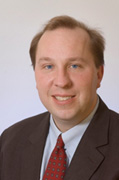Fitness for your BrainPowerful Patient, 2008 Week 43Joyce Graff, host, on webtalkradio.net
Beginning October 20, 2008
With dementia statistics rising, we are all concerned about the effects of aging or injury on our brains. Just as physical therapy is important to recovering muscle function, cognitive therapy can be helpful in maintaining or recovering brain function.
About Our Guest
Henry Mahncke, Ph.D., Vice President for Research and Outcomes at Posit Science in San Francisco, California.
Traumatic Brain Injury
We have all heard about the alarming rise in dementia among older people, and Posit Science has been featured on Public Television shows about the brain.
But brain injury encompasses much more than dementia. Sports injuries, minor in-home accidents, automobile accidents, and roadside bombs in war are just some of the many ways we might sustain a bruise or other injury to the brain. Brain surgery is also a cut to the brain which takes some recovery. While for the most part we do recover fully from minor injuries, they take time and deserve more understanding and respect than they usually receive.
Posit Science has been focusing their research on ways to keep our brains active and building neurons throughout our lives.
The brain may get to a point where processing is not as rapid as it used to be for a number of reasons:
On this program, Joyce Graff discusses the science of brain plasticity with Dr. Mahncke.
About Posit Science Products
As a complement to physical therapy and cognitive therapy, Posit Science has been developing a series of programs to exercise the brain and enhance visual functions or auditory functions.
Products are available at their website at http://positscience.com and include a money-back guarantee. If you do not feel they are helping you, you can return them for a full refund. You may have a significant discount through your health insurance or long-term insurance provider. Call Posit Science at
Further Reading about Brain Injury
There are a number of very helpful books on brain injury that I recommend to anyone who is dealing with brain injury themselves, or supporting a loved one with a brain injury:
Coping with Mild Traumatic Brain Injury by Diane Roberts Stoler
The Mild Traumatic Brain Injury Workbook: Your Program for Regaining Cognitive Function & Overcoming Emotional Pain (New Harbinger Self-Help Workbook) by Douglas J. Mason and Gottfried Jean-Louis
Living with Brain Injury: A Guide for Families, Second Edition by Richard C Senelick and Karla Dougherty
Brain Injury Survivor's Guide: Welcome to Our World by Larry Jameson and Beth Jameson
|
